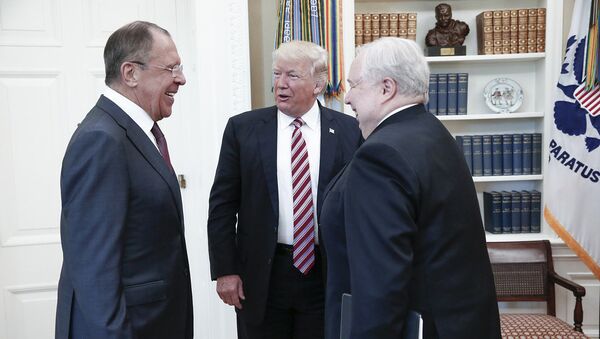Positive news about Russia hasn't exactly been making the headlines of mainstream US newspapers on a regular basis in recent years. And if you imagine anything Russia-related appearing on the front page of the New York Times or Washington Post, let alone CNN Headline News, most likely it would be an anti-Trump article, another spying conspiracy theory, or a story accusing Moscow of some other wrongdoing.
So when Russian foreign minister Sergey Lavrov arrived in Washington for negotiations with Secretary of State Pompeo and President Trump, the US media seemed more focused on attempts by Congress to impeach the US Commander-in-Chief. Many of the questions that Sergey Lavrov received during his news conference were either about Trump’s possible wrong-doings, the impeachment probe, or about sanctions. Russia’s top diplomat even jokingly summed up all the coincidences surrounding the talks:
“One of the questions was about my opinion on the coincidence of our delegation arriving in Washington when the new sanctions were being discussed, and a few minutes ago someone noted that our visit coincided with discussions about impeachment. It seems to me that no matter which day we choose for our visit to Washington it will coincide with either sanctions or impeachment.”
Lavrov’s Washington talks started in the morning on Tuesday when he met his US counterpart Pompeo over a working lunch at the State Department.
Journalists were escorted to the venue through the kitchen, so there was a chance to take a peek at what would be served to the diplomats.
The menu of ministerial luncheon included grilled fillet of beef tenderloin, autumn greens salad and toffee pudding cake for dessert (with some wine, and Coke, apparently), although political side of the meeting probably wasn’t as sugary and sweet as the soda and the dessert. pic.twitter.com/sGs2sUzwAy
— Denis Bolotsky (@BolotskySputnik) December 11, 2019
There are a number of issues where Moscow and Washington either disagree on something or have opposing views on the same problem – from the alleged “Russian meddling” in the 2016 US elections, which Russia categorically denies, offering the US to publish transcripts of diplomatic conversations on topic, to the conflict on Russian diplomatic property – the two compounds which were seized by US authorities in 2017. Another apple of discord is the issue of American visas, which Russian citizens can’t get because of long bureaucratic delays at US Consulates across the country.
🔹 Maria #Zakharova:
— MFA Russia 🇷🇺 (@mfa_russia) December 10, 2019
💬 “Joint efforts are hindered by the wave of suspicion towards Russia that has overcome #Washington,” Sergey #Lavrov said following his meeting with Mike Pompeo.
❗ Just to clarify: it is suspicion, not Russia that has overcome Washington. #Russia #USA pic.twitter.com/GfRPPAA6SY
Nevertheless, according to both Pompeo and Lavrov, Russia and the US may find common ground in other areas, such as the creation of the US-Russia business council, which will bring together influential private entrepreneurs, as well as cooperation between diplomats and intelligence agencies in the fight against terrorism and drug trafficking.
“Presidents Putin and Trump, when they met in Helsinki in the summer of last year supported our offer to work jointly on counter-terrorism tasks.” – says Lavrov – “Previously this work was being performed by a group within the Obama administration. During the peak period of anti-Russian decisions which were made in the US, this work was put on hold. Last year, when presidents Putin and Trump decided to restart cooperation in that area, we resumed our dialogue.”
Even though bilateral relations between the two nations are nowhere near the lowest historical points such as the Cuban missile crisis, or the years of the McCarthy witch hunts, Russia, according to the country’s top diplomat, is hoping, that the current Anti-Russian sentiment in America will vanish, “just as McCarthyism disappeared in the 1950s”.
Moscow says “let’s start from scratch”: according to Sergey Lavrov, Russia offered the US to put in writing commitments of non-interference in each other’s internal affairs. The US and USSR officials did the same in 1933 as the 2 countries were resuming diplomatic relations. pic.twitter.com/RCprq2QEDo
— Denis Bolotsky (@BolotskySputnik) December 11, 2019
It appears that Donald Trump, who invited Sergey Lavrov to the White House on Tuesday after his State Department negotiations was satisfied with the outcome of the meeting. Negotiations went on behind closed doors, but Trump mentioned some details in a tweet.
Just had a very good meeting with Foreign Minister Sergey Lavrov and representatives of Russia. Discussed many items including Trade, Iran, North Korea, INF Treaty, Nuclear Arms Control, and Election Meddling. Look forward to continuing our dialogue in the near future! pic.twitter.com/tHecH9a9ck
— Donald J. Trump (@realDonaldTrump) December 10, 2019
Trump wrote that he’s looking forward to further dialogue with Russia in future, which left the media wondering whether he would accept President Putin’s invitation to participate in the Victory Day celebrations in Moscow next May. The possibility of such a visit has yet to be confirmed by the White House.





